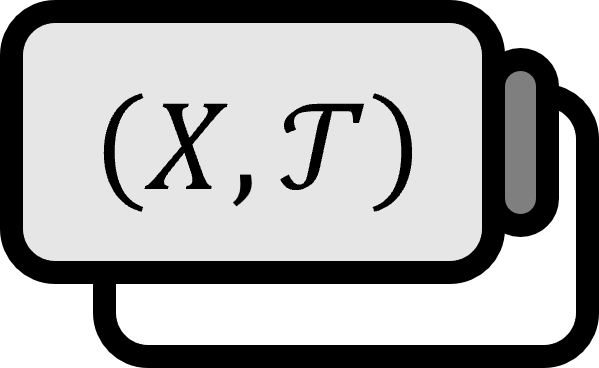Tikhonov's Theorem Proof
Theorem
An index set $\mathscr{A}$ is given.
If $\left\{ X_{\alpha} \ | \ \alpha \in \mathscr{A} \right\}$ is a set of compact spaces, then $\displaystyle X : = \prod_{\alpha \in \mathscr{A}} X_{ \alpha}$ is compact.
Explanation
Though this theorem might seem like a trivial property at first glance, it’s actually the opposite. It appears trivial but is surprisingly difficult to prove, making it deserving of its own name. The fact that compactness is preserved under the Cartesian product of topological spaces is an exceptionally useful trait.
Proof
Let $U_{\alpha} \subset X_{\alpha}$ be an open set of $X_{\alpha}$, and define the subbasis generating the product topology for the projection $p_{\alpha} : X \to X_{\alpha}$ as follows: $$ \mathscr{S} : = \left\{ p_{\alpha}^{-1} ( U_{\alpha} ) \ | \ U_{\alpha} \subset X_{\alpha} , \alpha \in \mathscr{A} \right\} $$ To use Alexander’s subbase theorem, show that every open cover of $\mathscr{S}$ has a finite subcover.
Alexander’s Subbase Theorem: Suppose $X$ is a topological space. $X$ is compact. There exists some subbase $\mathscr{S}$ for $X$ such that every open cover of $X$ consisting of members of $\mathscr{S}$ has a finite subcover.
Part 1.
Assume there exists an open cover $\mathscr{U} \subset \mathscr{S}$ that does not have a finite subcover.
Let $V$ denote an open set from $X_{\alpha}$. For all $\alpha \in \mathscr{A}$: $$ \mathscr{U}_{\alpha} = \left\{ V \mid p_{\alpha}^{-1} (V) \in \mathscr{U} \right\} $$ then $\mathscr{U}$ is as follows: $$ \mathscr{U} = \bigcup_{\alpha \in \mathscr{A}} \left\{ p_{\alpha}^{-1} (V) \ | \ V \in \mathscr{U}_{\alpha} \right\} $$
Part 2. Showing that $\mathscr{U}_{\alpha}$ is not an open cover of $X_{\alpha}$.
Assume that $\mathscr{U}_{\alpha}$ covers $X_{\alpha}$.
Since $X_{\alpha}$ is compact, there exists some $U_{\alpha_{1}} , \cdots , U_{\alpha_{n}} \in \mathscr{U}_{\alpha}$ satisfying $\displaystyle X_{\alpha } = \bigcup_{i=1}^{n} U_{\alpha_{i}}$. Then: $$ \left\{ p_{\alpha}^{-1} ( U_{\alpha_{i}} ) \ | \ i = 1, \cdots , n \right\} $$ becomes a finite subcover of $\mathscr{U}$, which contradicts the definition of $\mathscr{U}$ in Part 1. Therefore, $\mathscr{U}_{\alpha}$ cannot cover $X_{\alpha}$.
Part 3.
Since $\mathscr{U}_{\alpha}$ is not a cover of $X_{\alpha}$, for all $U_{\alpha} \in \mathscr{U}_{\alpha}$ there exists some $x_{\alpha} \in X_{\alpha}$ satisfying $x_{\alpha} \notin U_{\alpha}$. Then for all $U \in \mathscr{U}$, $p_{\alpha}^{-1} (x_{\alpha} ) \notin U$, and $\mathscr{U}$ cannot cover $X$. This means that there cannot exist an open cover $\mathscr{U} \subset \mathscr{S}$ that does not have a finite subcover. By Alexander’s subbase theorem, $X$ is compact.
■
